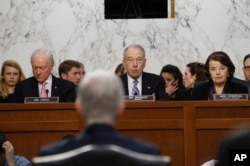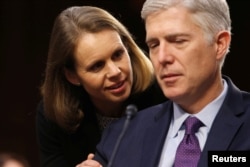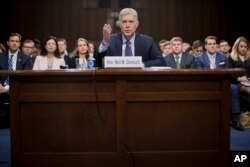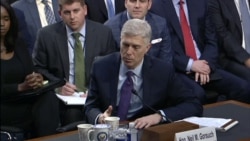A U.S. Senate panel considering the Supreme Court nomination of Judge Neil Gorsuch will hear testimony Thursday from lawyers, advocacy groups and other federal judges in the final stage of his confirmation hearing.
After that it will be up to the Senate Judiciary Committee to vote on whether to send the nomination to the full Senate, after spending this week questioning Gorsuch.
During Wednesday’s session, Gorsuch described a landmark 1973 pro-abortion rights decision as “the law of the land” but fended off numerous probing questions senators posed on other hot-button issues.
“The Supreme Court of the United States has held in Roe v. Wade that a fetus is not a person,” Gorsuch told the Senate Judiciary Committee, explaining the ruling that legalized abortion. “That’s the law of the land. I accept the law of the land.”
Gorsuch was tapped by President Donald Trump to fill the Supreme Court seat left vacant by the death of Justice Antonin Scalia more than a year ago. During last year’s campaign, Trump promised to nominate jurists who are committed to overturning Roe v. Wade, the linchpin for one of the most ferociously contested social issues in America.
A day earlier, Gorsuch described Roe v. Wade as legal precedent, but added that precedents can be overturned.
‘I speak for myself’
On other matters, Gorsuch repeatedly declined to share his views, to the mounting frustration of Democrats.
Vermont Senator Patrick Leahy asked if Gorsuch believed that the Voting Rights Act, which sought to eliminate barriers minority groups have faced in casting ballots, constitutes a “racial entitlement,” as Scalia once opined.
“I don’t speak for Justice Scalia. I speak for myself,” Gorsuch responded.
Leahy also asked Gorsuch to weigh in on a constitutional provision barring a U.S. president from accepting foreign gifts, a subject of much discussion in legal circles given Trump’s business dealings around the world.
“That is a subject on which there is ongoing litigation right now, senator, I believe - certainly threatened litigation and impending litigation - and I have to be very careful about expressing any views,” Gorsuch said.
“What worries me is you have been very much able to avoid any specificity [in your responses to questions] like no one I have ever seen before,” Democratic Senator Dianne Feinstein of California told the nominee. “For us on this side [Democrats], knowing where you stand on major questions of the day is really important.”
Republicans came to Gorsuch’s defense.
“There are some members of this body who have suggested that you are hiding your judicial philosophy,” Texas Senator John Cornyn said. “I don’t think they’ve been paying attention to the proceedings over the last day and a half. ... We’ve heard a description of your legal philosophy and the reasoning behind it time and time again.”
Corporate interests
Over two days of testimony, Democrats repeatedly pressed Gorsuch on what they see as his pro-corporate record as a federal appellate judge. Rhode Island Senator Sheldon Whitehouse argued that corporations wield too much power in Washington given their unlimited ability to make financial contributions to political campaigns, thanks to a Supreme Court decision known as Citizens United.
Gorsuch responded that, rather than looking to the courts to rein in corporate influence, lawmakers could do the job themselves.
“There’s room not just for litigation, senator, but legislation [as well],” the nominee said.
WATCH: Gorsuch on criticism of judges' motives
Whitehouse replied that a Congress beholden to corporate interests will never do as Gorsuch suggests.
“Here’s the problem. ... Once you let certain political interests achieve the kind of dominance that Citizens United has let them get, they can start to exert disproportionate control over Congress, and now Congress can’t do that any longer because there is no longer a fair playing field,” Whitehouse said.
Whatever objections Democrats may have, blocking Gorsuch from the high court will prove difficult. Republicans are in the majority and have the votes to approve him in committee and send his nomination to the full Senate. Once there, Republicans can change Senate rules to eliminate Democrats’ ability to block a final vote through the filibuster.









